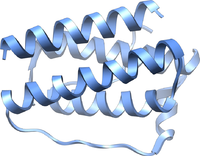
LKB1 suppresses androgen synthesis in a mouse model of hyperandrogenism via IGF‐1 signaling
Sign Up to like & getrecommendations! Published in 2019 at "FEBS Open Bio"
DOI: 10.1002/2211-5463.12723
Abstract: Polycystic ovary syndrome (PCOS) is a major cause of anovulatory sterility in women, and most PCOS patients exhibit hyperandrogenism (HA). Liver kinase b1 (LKB1) is a tumor suppressor that has recently been reported to be… read more here.
Keywords: via igf; igf signaling; androgen synthesis; hyperandrogenism ... See more keywords

The liver kinase B1 supports mammary epithelial morphogenesis by inhibiting critical factors that mediate epithelial‐mesenchymal transition
Sign Up to like & getrecommendations! Published in 2023 at "Journal of Cellular Physiology"
DOI: 10.1002/jcp.30975
Abstract: The liver kinase B1 (LKB1) controls cellular metabolism and cell polarity across species. We previously established a mechanism for negative regulation of transforming growth factor β (TGFβ) signaling by LKB1. The impact of this mechanism… read more here.
Keywords: morphogenesis; mediate epithelial; kinase; liver kinase ... See more keywords

Cell of Origin Links Histotype Spectrum to Immune Microenvironment Diversity in Non-small-Cell Lung Cancer Driven by Mutant Kras and Loss of Lkb1.
Sign Up to like & getrecommendations! Published in 2017 at "Cell reports"
DOI: 10.1016/j.celrep.2016.12.059
Abstract: Lung cancers exhibit pronounced functional heterogeneity, confounding precision medicine. We studied how the cell of origin contributes to phenotypic heterogeneity following conditional expression of KrasG12D and loss of Lkb1 (Kras;Lkb1). Using progenitor cell-type-restricted adenoviral Cre… read more here.
Keywords: spectrum; cell origin; immune microenvironment; lkb1 ... See more keywords

Lkb1 maintains Treg cell lineage identity
Sign Up to like & getrecommendations! Published in 2017 at "Nature Communications"
DOI: 10.1038/ncomms15876
Abstract: Regulatory T (Treg) cells are a distinct T-cell lineage characterized by sustained Foxp3 expression and potent suppressor function, but the upstream dominant factors that preserve Treg lineage-specific features are mostly unknown. Here, we show that… read more here.
Keywords: lineage; cell lineage; expression; lkb1 ... See more keywords

Role of LKB1 in migration and invasion of Cr(VI)-transformed human bronchial epithelial Beas-2B cells
Sign Up to like & getrecommendations! Published in 2018 at "Anti-Cancer Drugs"
DOI: 10.1097/cad.0000000000000638
Abstract: Hexavalent chromium [Cr(VI)] is a common human carcinogen associated with lung cancer and other pulmonary diseases as exposure to excessive Cr(VI) induces malignant transformation in human lung epithelial cells. The mechanism underlying its carcinogenicity is… read more here.
Keywords: beas cells; bgr; migration; lkb1 ... See more keywords

Is downregulation of liver kinase B1 the major factor driving epithelial‐to‐mesenchymal transition?
Sign Up to like & getrecommendations! Published in 2021 at "American Journal of Transplantation"
DOI: 10.1111/ajt.16941
Abstract: Chronic lung allograft dysfunction (CLAD) is a major barrier limiting longterm survival after lung transplantation. Multiple pathophysiological mechanisms are involved, including inflammation, fibroblast proliferation, and extracellular matrix deposition. Dysregulated epithelial repair and airway remodeling are… read more here.
Keywords: lung; lkb1; kinase; growth ... See more keywords

AhR activation promotes Treg cell generation by enhancing Lkb1-mediated fatty acid oxidation via the Skp2/K63-ubiquitination pathway.
Sign Up to like & getrecommendations! Published in 2023 at "Immunology"
DOI: 10.1111/imm.13638
Abstract: Several aryl hydrocarbon receptor (AhR) agonists have been reported to promote the generation of regulatory T cells (Treg cells), and the action mechanisms need to be identified. In this study, we addressed the underlying mechanism… read more here.
Keywords: skp2; k63 ubiquitination; generation; lkb1 ... See more keywords

The LKB1–AMPK-α1 signaling pathway triggers hypoxic pulmonary vasoconstriction downstream of mitochondria
Sign Up to like & getrecommendations! Published in 2018 at "Science Signaling"
DOI: 10.1126/scisignal.aau0296
Abstract: Perfusion-ventilation matching in the lungs requires AMPK-α1 and AMPK-α2 activation downstream of LKB1. Hypoxia amps AMPK Most arteries in the body vasodilate in response to hypoxia. In contrast, pulmonary arteries constrict in response to hypoxia… read more here.
Keywords: pulmonary vasoconstriction; ampk; vasoconstriction; hypoxic pulmonary ... See more keywords

POS0005 THE EFFECT OF LKB1 INHIBITION IN RA PATHOGENESIS
Sign Up to like & getrecommendations! Published in 2021 at "Annals of the Rheumatic Diseases"
DOI: 10.1136/annrheumdis-2021-eular.946
Abstract: Liver kinase B1 (LKB1) is known as a tumor suppressor gene and also inhibits reactive oxygen species (ROS) levels. Intracellular ROS are catalyzed by the enzyme complex nicotinamide adenine dinucleotide phosphate (NADPH) oxidase (NOX). We… read more here.
Keywords: expression; pathogenesis; lkb1 inhibition; lkb1 ... See more keywords

LKB1/AMPK Pathway and Drug Response in Cancer: A Therapeutic Perspective
Sign Up to like & getrecommendations! Published in 2019 at "Oxidative Medicine and Cellular Longevity"
DOI: 10.1155/2019/8730816
Abstract: Inactivating mutations of the tumor suppressor gene Liver Kinase B1 (LKB1) are frequently detected in non-small-cell lung cancer (NSCLC) and cervical carcinoma. Moreover, LKB1 expression is epigenetically regulated in several tumor types. LKB1 has an… read more here.
Keywords: lkb1 ampk; response; lkb1; cancer ... See more keywords

PARP inhibition induces synthetic lethality and adaptive immunity in LKB1-mutant lung cancer.
Sign Up to like & getrecommendations! Published in 2022 at "Cancer research"
DOI: 10.1158/0008-5472.can-22-1740
Abstract: Contradictory characteristics of elevated mutational burden and a "cold" tumor microenvironment (TME) coexist in LKB1-mutant non-small cell lung cancers (NSCLC). The molecular basis underlying this paradox and strategies tailored to these historically difficult-to-treat cancers are… read more here.
Keywords: inhibition; lkb1 mutant; lung; synthetic lethality ... See more keywords